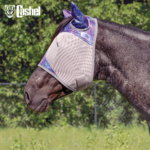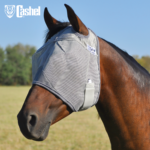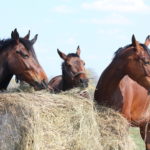It is so frustrating when you walk out to the barn and find your horse with a chunk of his mane or tail gone. Though there is no miracle cure for the problem, there are ways to prevent your horse from rubbing out his mane and tail in the future. The biggest thing in keeping a horse from rubbing out his hair is to keep it clean.

Fungus and insects are the main reason horses rub their manes, so keeping them free of these bugs will make them less likely to rub and tear out the hair.
When you first get a horse in your barn, wash out his mane and tail with an antibacterial shampoo. If the horse already has a portion of his mane rubbed out, you need to identify why he rubs it. It could just be dirt from the pasture, but if it is a fungus, you need to clear that up right away. If it is mites or lice, you will have to use something to kill the insects.
After you have washed the mane and tail, rinse out all of the shampoo. Use some kind of light oil to soothe dryness. Some horses are allergic to the fragrance in baby oil, so mineral oil is a good option.
When it comes to training a horse’s mane to lie down or waiting for parts to grow out, you have to be careful with braiding the mane. If you braid it too tight, it could irritate the skin, and the horse will itch and have a tendency to rub out the braids after a week or so. To avoid this, use heavy petroleum jelly rather than braiding to train manes. Also, after you have banded a mane, it is important to take out the bands when you are done, so the horse doesn’t try to rub out the bands.
If you use hoods, make sure they are lined with satin to keep the hood from rubbing the mane. Avoid sharing hoods between horses because this can pass fungus and insects from horse to horse. It’s also a good idea to have separate combs and brushes for each horse to keep from spreading skin problems and to wash the combs and brushes regularly.
It may take a month or so to grow back a rubbed-out section of mane, and there is really no miracle to grow it back faster.
If you have a horse who rubs his tail at the top, he probably has pinworms, which are common in babies. A strong parasite control program will remedy this problem.
Babies will chew on other?s tails, but there are some commercial products that keep them from it. You can spray tabasco sauce or Coppertox on the tail to make the chewers dislike the taste. There are a lot of remedies out there for tail chewing. Make sure not to spray the product on the bone, though, because it will irritate the skin, causing the horse to rub. You need to wash out these products and reapply them often.





